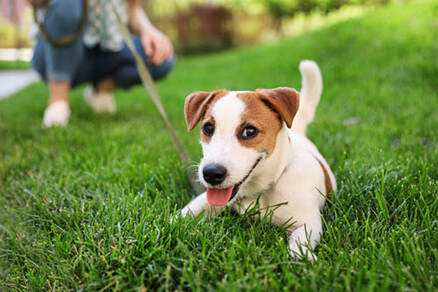Animal Information for Lantana Residents

Animal Control:
Animal Noise Complaints:
This is the recommended process for handling animal noise complaints in Lantana:
- Animal Control services in Lantana are provided by the Denton County Sheriff. Call 940-349-1600 x9 (non-emergency) or 911 (emergency).
If an animal is found unrestrained it will be rescued and taken to the City of Denton Animal Shelter. The Sheriff’s Office encourages anyone looking for a missing animal or wanting to adopt an animal to check the City of Denton animal shelter: https://www.cityofdenton.com/en-us/government/departments/animal-services - For dead animals in the Denton County Fresh Water Supply District's easements, rights-of-way, or streets, call 940-728-5050.
Animal Noise Complaints:
This is the recommended process for handling animal noise complaints in Lantana:
- Have a friendly conversation with your neighbor. Sometimes they just don't know or understand how it is affecting others.
- To report a barking dog to the HOA, you need to provide:
1) Log of dates/times/duration of barking and
2) Video recording of the barking.
The HOA states that the information is only used internally and not shared with the other owner. Owners have 10 days to cure violations. If the barking continues after 10 days, provide the new evidence to the HOA so they can take further action.
Contact information for HOA: https://lantana.nabrnetwork.com - Lantana is in an unincorporated area (not within a city). There are no noise ordinances enforceable by law enforcement. If you call the Sheriff's office, they can knock on the neighbor's door and make the neighbor aware of the barking, but they cannot enforce anything.
Contact information for Denton County Sheriff: 940-349-1600 x9 (non-emergency) or 911 (emergency)
HOA Bylaws:
Section 9.11 (b) "Any noise or odor emitted by, and any discharge or waste from, any animal (including without limitation dogs and cats) which can be seen, heard or smelled outside the perimeter of the subject Owner's (or Member's or Resident's) Lot shall be deemed noxious and offensive and is therefore prohibited. No animals, livestock or poultry of any kind shall be raised, bred or kept on any Residential Lot, except that no more than five (5) dogs, cats or other household pets may be kept, provided that they are not kept, bred or maintained for commercial purposes and they are not noxious, offensive, vicious (e.g. pit bull terriers shall not be permitted within the Addition) or dangerous. Any outside pen, cage, shelter, concrete pot pad, run, track or other building, structure or device directly or indirectly related to animals which can be seen, heard or smelled by anyone other than the subject Lot Owner must be approved by the ARC in its sole and absolute discretion. Each and every dog, cat or other household pet, if not kept and confined within an enclosed non-visible portion of the Owner's/Member's/Resident's Lot, must be leashed and accompanied by its corresponding Owner/Member/Resident, particularly when traveling beyond the perimeter of the Owner's/Member's/Resident's Lot, and such Owner/Member/Resident shall promptly clean and remove the discharge and waste of any pet."
Section 9.11 (b) "Any noise or odor emitted by, and any discharge or waste from, any animal (including without limitation dogs and cats) which can be seen, heard or smelled outside the perimeter of the subject Owner's (or Member's or Resident's) Lot shall be deemed noxious and offensive and is therefore prohibited. No animals, livestock or poultry of any kind shall be raised, bred or kept on any Residential Lot, except that no more than five (5) dogs, cats or other household pets may be kept, provided that they are not kept, bred or maintained for commercial purposes and they are not noxious, offensive, vicious (e.g. pit bull terriers shall not be permitted within the Addition) or dangerous. Any outside pen, cage, shelter, concrete pot pad, run, track or other building, structure or device directly or indirectly related to animals which can be seen, heard or smelled by anyone other than the subject Lot Owner must be approved by the ARC in its sole and absolute discretion. Each and every dog, cat or other household pet, if not kept and confined within an enclosed non-visible portion of the Owner's/Member's/Resident's Lot, must be leashed and accompanied by its corresponding Owner/Member/Resident, particularly when traveling beyond the perimeter of the Owner's/Member's/Resident's Lot, and such Owner/Member/Resident shall promptly clean and remove the discharge and waste of any pet."

Leash Law:
Denton County has a Leash Law for all dogs. A Leash Law means the animal must be restrained if it is not on property belonging to the animal’s owner.
Pet Registration (Dog/Cat License):
Pet registration is not required in Lantana. Collars with contact information and/or microchips are recommended for all pets to help reunite lost pets with their owners. Don't forget to update your microchip registration information whenever you move.
Poison Control:
The ASPCA Animal Poison Control Center (APCC) is a resource for poison-related pet emergencies. If you think your pet may have ingested a potentially poisonous substance, call 888-426-4435. A consultation fee may be required. For more information about plants, foods, and household products that are dangerous for your pets, visit the ASPCA web site.
Rabies Vaccination:
According to Texas law, dogs and cats must be vaccinated by a veterinarian by the time the animal is four months of age, then given a booster 12 months after the initial vaccination. Thereafter, the animal must be vaccinated at intervals of no longer than 36 months if a 3-year vaccine is used. However, your veterinarian may prefer to use a 1-year vaccine. Your veterinarian can explain the pros and cons to you pertaining to which vaccine to use with your pet. Although not required by state law, there are many other diseases for which your pet should be immunized annually. To safeguard your pet's and your family's health, you should visit your veterinarian at least once a year.
Snakes:
Texas Dog Laws:
Denton County has a Leash Law for all dogs. A Leash Law means the animal must be restrained if it is not on property belonging to the animal’s owner.
Pet Registration (Dog/Cat License):
Pet registration is not required in Lantana. Collars with contact information and/or microchips are recommended for all pets to help reunite lost pets with their owners. Don't forget to update your microchip registration information whenever you move.
Poison Control:
The ASPCA Animal Poison Control Center (APCC) is a resource for poison-related pet emergencies. If you think your pet may have ingested a potentially poisonous substance, call 888-426-4435. A consultation fee may be required. For more information about plants, foods, and household products that are dangerous for your pets, visit the ASPCA web site.
Rabies Vaccination:
According to Texas law, dogs and cats must be vaccinated by a veterinarian by the time the animal is four months of age, then given a booster 12 months after the initial vaccination. Thereafter, the animal must be vaccinated at intervals of no longer than 36 months if a 3-year vaccine is used. However, your veterinarian may prefer to use a 1-year vaccine. Your veterinarian can explain the pros and cons to you pertaining to which vaccine to use with your pet. Although not required by state law, there are many other diseases for which your pet should be immunized annually. To safeguard your pet's and your family's health, you should visit your veterinarian at least once a year.
Snakes:
- If you come across a snake in Lantana and want it relocated, call Rob Boles, Lantana's snake whisperer: 972-317-5853.
- If you want to post a photo or ask questions about snakes: https://www.facebook.com/groups/whatsnakeisthis/
- If you are bitten by a venomous snake, call 911 immediately, especially if the area changes color, begins to swell or is painful. (source: Mayo Clinic)
If possible, take these steps while waiting for medical help:
- Remain calm and move beyond the snake's striking distance.
- Remove jewelry and tight clothing before you start to swell.
- Position yourself, if possible, so that the bite is at or below the level of your heart.
- Clean the wound, but don't flush it with water. Cover it with a clean, dry dressing.
Caution:
- Don't use a tourniquet or apply ice.
- Don't cut the wound or attempt to remove the venom.
- Don't drink caffeine or alcohol, which could speed your body's absorption of venom.
- Don't try to capture the snake. Try to remember its color and shape so that you can describe it, which will help in your treatment.
Texas Dog Laws:
- For a comprehensive list of the state's dog laws, visit the Animal Law Web Center.
Help Your Pets Be Better Neighbors (Message from the Lantana HOA):
Pets are a part of the Community just like their owners. Here are a few things to consider about your pet' s care and behavior that could potentially cause issues between pet owners and other residents.
Pets are a part of the Community just like their owners. Here are a few things to consider about your pet' s care and behavior that could potentially cause issues between pet owners and other residents.

It is normal for dogs to bark. However, when that barking turns into loud and continuous barking or frequent bursts of barking throughout the day or night, it can become a serious noise nuisance for those around you.
My dog barks a lot, what can I do?
The more tired a dog is the less it will bark, consider making time to take your dog for daily walks/run or some other form of regular exercise.
- Do not leave your dog alone for long periods of time.
- Try not to excite your dog too much when playing as this could lead to barking. Keep calm and play on!
- Do not leave your dog outside late at night or early in the morning if it is prone to barking.

Lantana's governing documents state that all pets that are not kept or confined within the Resident's lot, must be leashed and accompanied by its corresponding owner.
What are the benefits of leashing your dog?
There are many reasons you should leash your dog when taking it out into the community.
What are the benefits of leashing your dog?
- It is a great way to show your pet affection through assurances of protection.
- Helps avoid legal issues that may occur if your rambunctious pet "attacks" or hurts another resident or pet.
- A dog that is attached to you will ward off anyone seeing you as an "easy target".
- You are seen as a good owner, and it promotes good canine citizenship.
There are many reasons you should leash your dog when taking it out into the community.
- No dog responds to commands 100% of the time.
- Not everyone likes dogs. Some cultures perceive dogs very differently than others.
- The fear of dogs is fairly common and even a certain percentage of adults have a fear of dogs, regardless of their size or temperament.
|
By taking a few simple steps to clean up after your pet, you can contribute to not only the beautification of our Community but also towards the elimination of one of the most irritating nuisances in our Community! No one likes it, but it is better to quickly pick it up than leaving the unsightly and smelly mess there for someone to step in! Be Considerate, Be a Good Neighbor
|



